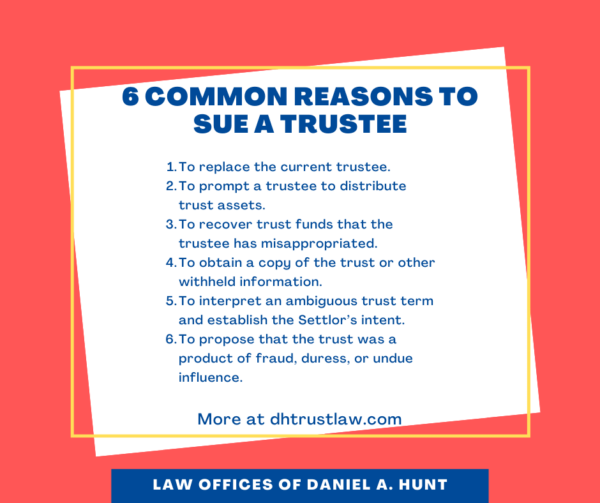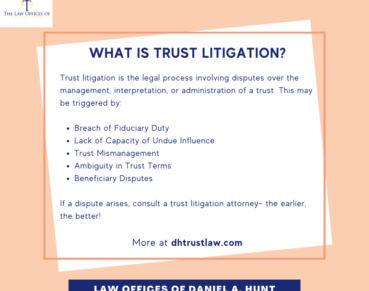Why and How to Sue a Trustee

Litigation is the process of taking legal action against someone else. Trust and estate litigation usually involves trust beneficiaries taking legal action against a trustee. If you’re a beneficiary wondering if you should invest time and money to pursue legal action against a “bad trustee”, you probably want to know if you have a case. Understanding why and how to sue a trustee can help you make the best decision for your unique personal circumstances.
Why Sue a Trustee?
Generally, suits against trustees tend to be brought by trust beneficiaries who want to accomplish one or more of these objectives:
- Remove a trustee and replace them with a more appropriate person.
- Prompt a trustee to distribute trust assets and complete the trust administration.
- Recover trust funds that the trustee has misappropriated.
- Obtain a copy of the trust or other trust-related information that has been withheld (like tax returns, an accounting of trust assets, etc.).
- Obtain an interpretation of an ambiguous trust term and establish the Settlor’s intent.
- Propose that the trust instrument was a product of fraud, duress, or undue influence.
Potentially Legitimate Reasons to Sue a Trustee
Before you secure legal representation, you may be wondering, “Do I have a legitimate case?” Here are some common reasons lawsuits can be successfully brought against a trustee.
- Breach of trust: This means the trustee is administering the trust in a manner that violates the terms of the trust instrument. For example, if the trust directed that a beneficiary’s distribution was to be paid outright, but the trustee is attempting to hold those funds “in trust” (meaning to manage them on behalf of the beneficiary), that would be a breach of trust.
- Breach of Fiduciary Duty: A trustee has numerous duties in their role under the California Probate Code. A violation of these duties is called a “Breach of Fiduciary Duty”. For example, a trustee who favors one beneficiary (or themself, if they’re also a beneficiary) over another has violated their Duty to Deal Impartially with Beneficiaries.
- Misappropriation of trust funds: This means the trustee has been paying for things that don’t directly benefit the trust. For example, if the trustee has been using trust funds to purchase themself designer handbags or a new Lexus, that would be a misappropriation of trust funds.
- Mismanagement of trust funds: This means the trustee is failing to make trust property productive or incurring economic waste. If the trustee fails to address poorly performing trust investments, that is an example of mismanaging trust funds.
- Malfeasance: This means the trustee has acted “in bad faith”, or done something that is purposely injurious to the beneficiary. An example of malfeasance could be a trustee who donates trust assets in a beneficiary’s name to a political organization they oppose. (Yes, we’ve seen this happen in real life.)
- Fraud: Fraud means that the trustee has misrepresented a material fact intending to mislead or deprive. For example, a trustee is committing fraud if they lie to a trust beneficiary and tell them that no trust exists.
Illegitimate Reasons to Sue a Trustee
While there are many legally valid reasons to sue a trustee, your case probably won’t get very far in the following situations:
- The Settlor disinherited you from their estate or left you less than other beneficiaries in a properly executed estate plan. While it may not feel fair to be disinherited or get less than others, you can’t sue anyone over this decision unless the trust was a product of fraud, duress, or undue influence.
- The trustee took a reasonable trustee’s fee which decreased the amount of your inheritance. Trustees are entitled to reasonable compensation for the work they perform in this role.
Two Key Questions to Consider
Think you have a strong legal case? Here are two important questions to consider before taking legal action:
- Do you have sufficient evidence? The person suing a trustee bears the “burden of proof” to prove that the trustee has behaved unethically and should be removed. If you present insufficient evidence, the judge will likely dismiss your suit.
- Does the trust contain a “no-contest clause”? This common trust clause is intended to discourage frivolous attempts to overthrow estate plans. You may find yourself disinherited if you bring a suit. Be sure to have an attorney review the trust instrument (if you have a copy) before bringing a suit and discuss with them the ramifications of legal action on your inheritance.
How to Sue a Trustee
If you decide that suing a trustee is the right choice for you, here are the basic steps of a typical trust litigation case:
- Seek legal representation. Trust and estate litigation is a highly specialized niche. Most estate planning law firms either don’t handle litigation matters at all or have very little experience doing so. For optimal results, find an attorney who is experienced in trust and estate litigation specifically.
- File a petition with the court. California Probate Code §17200 is the most common code section used to petition the court for relief in matters like these. But other code sections may apply more accurately to your case. An experienced trust litigator can help you select the right one and maximize your chances of success.
- Serve the petition to the trustee or the attorney/law firm representing them.
- Appear at a court hearing with your attorney to present your case to the judge.
- The judge’s ruling dictates what comes next. The judge may grant your petition, deny it, or set an evidentiary hearing to collect more information. Alternatively, both parties may schedule a settlement conference or use a professional mediator to try to work out a solution.
Who Pays the Legal Fees?
If you’re a beneficiary considering suing a trustee, you will need to find assets to fund the suit on your own. Eventually, you may be able to ask the court for reimbursement of your legal fees. But you will need to pay out of pocket to retain legal counsel and start the litigation process.
If you have any questions about trust and estate litigation, feel free to contact our office.
Law Offices of Daniel A. Hunt
The Law Offices of Daniel A. Hunt is a California law firm specializing in Estate Planning; Trust Administration & Litigation; Probate; and Conservatorships. We've helped over 10,000 clients find peace of mind. We serve clients throughout the greater Sacramento region and the state of California.




